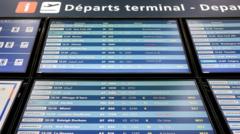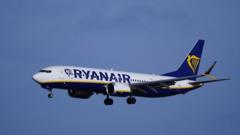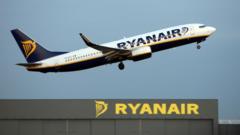Tens of thousands of travelers have found their holiday plans suddenly derailed due to a two-day air traffic control strike in France. Ryanair announced that they had to cancel over 170 flights, directly impacting more than 30,000 passengers. The strike, led by two prominent French unions, has seen a significant portion of flights at major airports in Paris and Nice being brought to a halt.
This disruption has not only affected routes within and to France but has also impacted flights flying over French airspace bound for destinations including the UK, Ireland, Spain, and Greece. Ryanair's CEO, Michael O'Leary, criticized the air traffic controllers for "holding European families to ransom" and called for immediate action from European Commission President Ursula von der Leyen to ensure minimum service levels during strikes.
French Transport Minister Philippe Tabarot condemned the timing and nature of the strike, labeling the unions' demands as "unacceptable." France's civil aviation authority, DGAC, prompted airlines to cut flight schedules at several local airports, leading to calls for such measures as Friday approaches, anticipating an even sharper decline in available flights.
The UNSA-ICNA union initiated the strike in response to issues concerning under-staffing, management practices, and a contentious new clock-in requirement for air traffic controllers. Failed negotiations with the DGAC earlier this week escalated tensions and prompted the continuation of the walkout.
Airlines for Europe (A4E), the leading aviation association in Europe, denounced the strike as "intolerable" and cautioned that the timing could not be worse for travelers during peak summer vacation periods. Following Ryanair's cancellations, EasyJet also voiced their frustration, urging for a swift resolution to the ongoing dispute.
Despite the recent challenges, Ryanair reported operating over 109,000 flights in June, suggesting that the cancellations represented less than 1% of their overall operations. However, the airline also noted that external factors, including conflicts such as the recent events in the Middle East, have contributed to travel disruptions, leading to over 800 flights cancelled last month alone.





















